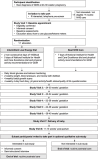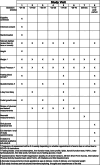Manchester Intermittent Diet in Gestational Diabetes Acceptability Study (MIDDAS-GDM): a two-arm randomised feasibility protocol trial of an intermittent low-energy diet (ILED) in women with gestational diabetes and obesity in Greater Manchester
- PMID: 38341207
- PMCID: PMC10862275
- DOI: 10.1136/bmjopen-2023-078264
Manchester Intermittent Diet in Gestational Diabetes Acceptability Study (MIDDAS-GDM): a two-arm randomised feasibility protocol trial of an intermittent low-energy diet (ILED) in women with gestational diabetes and obesity in Greater Manchester
Abstract
Introduction: The prevalence of gestational diabetes mellitus (GDM) is rising in the UK and is associated with maternal and neonatal complications. National Institute for Health and Care Excellence guidance advises first-line management with healthy eating and physical activity which is only moderately effective for achieving glycaemic targets. Approximately 30% of women require medication with metformin and/or insulin. There is currently no strong evidence base for any particular dietary regimen to improve outcomes in GDM. Intermittent low-energy diets (ILEDs) are associated with improved glycaemic control and reduced insulin resistance in type 2 diabetes and could be a viable option in the management of GDM. This study aims to test the safety, feasibility and acceptability of an ILED intervention among women with GDM compared with best National Health Service (NHS) care.
Method and analysis: We aim to recruit 48 women with GDM diagnosed between 24 and 30 weeks gestation from antenatal clinics at Wythenshawe and St Mary's hospitals, Manchester Foundation Trust, over 13 months starting in November 2022. Participants will be randomised (1:1) to ILED (2 low-energy diet days/week of 1000 kcal and 5 days/week of the best NHS care healthy diet and physical activity advice) or best NHS care 7 days/week until delivery of their baby. Primary outcomes include uptake and retention of participants to the trial and adherence to both dietary interventions. Safety outcomes will include birth weight, gestational age at delivery, neonatal hypoglycaemic episodes requiring intervention, neonatal hyperbilirubinaemia, admission to special care baby unit or neonatal intensive care unit, stillbirths, the percentage of women with hypoglycaemic episodes requiring third-party assistance, and significant maternal ketonaemia (defined as ≥1.0 mmol/L). Secondary outcomes will assess the fidelity of delivery of the interventions, and qualitative analysis of participant and healthcare professionals' experiences of the diet. Exploratory outcomes include the number of women requiring metformin and/or insulin.
Ethics and dissemination: Ethical approval has been granted by the Cambridge East Research Ethics Committee (22/EE/0119). Findings will be disseminated via publication in peer-reviewed journals, conference presentations and shared with diabetes charitable bodies and organisations in the UK, such as Diabetes UK and the Association of British Clinical Diabetologists.
Trial registration number: NCT05344066.
Keywords: diabetes & endocrinology; diabetes in pregnancy; feasibility studies; maternal medicine; nutrition & dietetics; obesity.
© Author(s) (or their employer(s)) 2024. Re-use permitted under CC BY. Published by BMJ.
Conflict of interest statement
Competing interests: Michelle Harvie has coauthored three self-help books for the public to follow intermittent diets. All author proceeds are paid directly to the charity Prevent Breast Cancer (registered charity number 1109839) to fund breast cancer research.
Figures
References
-
- The British Diabetic Association . Diabetes UK. What is gestational diabetes? n.d. Available: https://www.diabetes.org.uk/diabetes-the-basics/gestational-diabetes
Publication types
MeSH terms
Substances
Associated data
LinkOut - more resources
Full Text Sources
Medical



